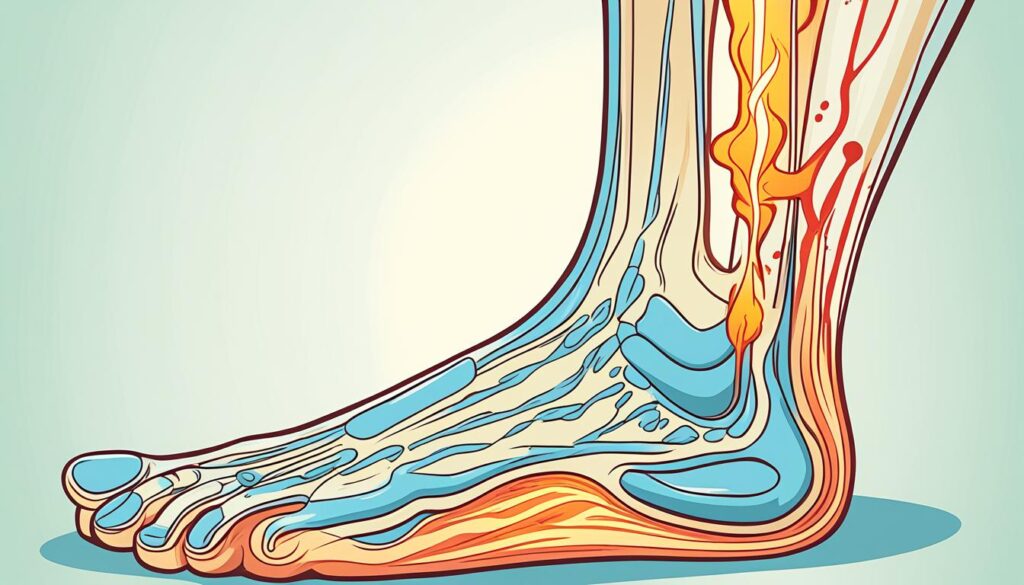Welcome to our blog post where we will discuss the symptoms associated with diabetic neuropathy, a common complication of diabetes. If you or someone you know has diabetes, it’s essential to be aware of these symptoms for early detection and effective management.
Diabetic neuropathy occurs when diabetes damages the nerves throughout the body, leading to a range of symptoms. By understanding and recognizing these symptoms, individuals can take proactive steps to address them and improve their quality of life.
In the following sections, we will explore different types of diabetic neuropathy and the specific symptoms associated with each. From peripheral neuropathy to autonomic neuropathy, focal neuropathy, and proximal neuropathy, we’ll cover it all.
Table of Contents
ToggleWhat is Diabetic Neuropathy?
Diabetic neuropathy is a condition characterized by nerve damage caused by diabetes. It is one of the most common complications associated with diabetes. Nerve damage can occur throughout the body, impacting various organs and systems, resulting in a wide range of symptoms.
Diabetic neuropathy develops gradually over time, primarily due to high blood sugar levels. Prolonged exposure to elevated glucose levels can cause damage to the walls of the tiny blood vessels that supply oxygen and nutrients to the nerves. This, in turn, affects the nerve’s ability to transmit signals effectively.
The exact causes of diabetic neuropathy are not fully understood. However, several factors increase the risk of developing this condition. These include long-standing diabetes, poor blood sugar control, high blood pressure, high cholesterol levels, obesity, smoking, and a sedentary lifestyle.
There are four main types of diabetic neuropathy:
- Peripheral neuropathy
- Autonomic neuropathy
- Focal neuropathy
- Proximal neuropathy
Peripheral Neuropathy
Peripheral neuropathy is the most common type of diabetic neuropathy. It affects the nerves in the extremities, such as the hands, legs, and feet. Symptoms may include tingling or numbness, burning or shooting pain, sensitivity to touch, and muscle weakness. These sensations often start in the toes and feet and gradually progress upwards.
| Symptoms of Peripheral Neuropathy | Common | Rare |
|---|---|---|
| Tingling or numbness in the hands or feet | ✓ | |
| Burning or shooting pain | ✓ | |
| Sensitivity to touch | ✓ | |
| Muscle weakness | ✓ |
Autonomic Neuropathy
Autonomic neuropathy affects the nerves that control involuntary functions in the body, such as heart rate, digestion, and bladder function. Symptoms may include dizziness or fainting, digestive issues, urinary problems, and sexual dysfunction.
Focal Neuropathy
Focal neuropathy affects specific nerves in the body and usually occurs suddenly. It can cause severe pain in a specific area, muscle weakness, and difficulty focusing.
Proximal Neuropathy
Proximal neuropathy affects the nerves in the thighs, hips, and buttocks. It can cause severe pain, muscle weakness, and difficulty standing up from a seated position.
Understanding the different types of diabetic neuropathy and their associated symptoms is crucial for early detection and management. If you experience any of these symptoms, it’s important to consult with a healthcare professional for a proper diagnosis and treatment plan.
Types of Diabetic Neuropathy
Diabetic neuropathy manifests in various types, each with its own set of symptoms and implications. Understanding these different types can help in identifying and managing the condition effectively. Let’s explore the four primary types of diabetic neuropathy:
1. Peripheral Neuropathy
Peripheral neuropathy is the most common type of diabetic neuropathy. It occurs when there is damage to the peripheral nerves, mainly affecting the extremities such as the hands and feet. Symptoms may include tingling, numbness, and a burning sensation. Over time, it can lead to loss of sensation and coordination.
2. Autonomic Neuropathy
Autonomic neuropathy affects the autonomic nervous system, which controls involuntary bodily functions. This type of neuropathy can affect various organs, leading to symptoms such as dizziness, digestive issues, urinary problems, and sexual dysfunction.
3. Focal Neuropathy
Focal neuropathy is characterized by damage to specific nerves in the body, leading to sudden and localized symptoms. It can cause severe pain in a particular area, muscle weakness, and difficulty focusing. Focal neuropathy usually resolves on its own over time.
4. Proximal Neuropathy
Proximal neuropathy, also known as diabetic amyotrophy, affects the nerves in the thighs, hips, and buttocks. It typically presents as severe pain, muscle weakness, and difficulty standing up from a seated position. Proximal neuropathy can impact mobility and daily activities.
It is important to note that individuals with diabetes can develop multiple types of diabetic neuropathy simultaneously or experience overlapping symptoms. A comprehensive evaluation by a healthcare professional is essential for accurate diagnosis and appropriate management.

Symptoms of Diabetic Peripheral Neuropathy
Diabetic peripheral neuropathy is a condition that can cause various symptoms in individuals with diabetes. It primarily affects the peripheral nerves, which connect the brain and spinal cord to the rest of the body. Recognizing these symptoms is crucial for early detection and appropriate management. Let’s explore the common signs of diabetic peripheral neuropathy:
Tingling or Numbness
One of the hallmark symptoms of diabetic peripheral neuropathy is persistent tingling or numbness in the hands or feet. This sensation may feel like pins and needles or a loss of feeling altogether. It often starts in the toes or fingertips and gradually progresses up the limbs. This phenomenon is known as “stocking-glove” distribution, where the affected areas resemble the shape of stockings or gloves.
Sensitivity to Touch
People with diabetic peripheral neuropathy may experience heightened sensitivity to touch, also known as tactile allodynia. Even light pressure or gentle contact can be uncomfortable or painful. This increased sensitivity can make everyday activities like wearing shoes or putting on socks challenging.
Muscle Weakness
Another symptom of diabetic peripheral neuropathy is muscle weakness in the affected areas. This weakness can make it difficult to perform normal tasks that require strength and coordination, such as gripping objects or walking. The muscles may feel tired or fatigued more quickly than usual.

Balance Issues
Individuals with diabetic peripheral neuropathy may also experience balance problems. The loss of sensation in the feet and legs can affect proprioception, the body’s ability to sense its position in space. This can lead to an increased risk of falls or difficulty maintaining an upright posture.
If you are experiencing any of these symptoms, it is essential to consult with a healthcare professional for a proper diagnosis. Timely intervention and management can help alleviate discomfort and prevent further progression of diabetic peripheral neuropathy.
Symptoms of Autonomic Neuropathy
Autonomic neuropathy is a type of diabetic neuropathy that affects the autonomic nervous system. This intricate network of nerves controls involuntary bodily functions, such as blood pressure, digestion, bladder function, and sexual response. When autonomic neuropathy occurs as a complication of diabetes, it can lead to various symptoms that affect these vital functions.
Individuals with autonomic neuropathy may experience:
- Dizziness: A feeling of lightheadedness or faintness, especially upon standing up, due to blood pressure fluctuations.
- Digestive issues: Problems with digestion, including nausea, vomiting, bloating, or constipation. These symptoms can stem from impaired nerve signals to the gastrointestinal tract.
- Urinary problems: Difficulty emptying the bladder completely, experiencing frequent urination or urinary incontinence. Autonomic neuropathy can disrupt the normal function of the bladder.
- Sexual dysfunction: Impaired sexual response in both men and women, including erectile dysfunction in men and difficulty achieving orgasm in women. Autonomic neuropathy can lead to reduced blood flow and nerve damage in the genital area.
If you are living with diabetes and experience any of these symptoms, it is essential to consult with your healthcare professional for a proper diagnosis and appropriate management. Early detection and treatment can help alleviate symptoms and improve your overall quality of life.
| Symptom | Description |
|---|---|
| Dizziness | A feeling of lightheadedness or faintness, especially upon standing up, due to blood pressure fluctuations. |
| Digestive issues | Problems with digestion, including nausea, vomiting, bloating, or constipation. These symptoms can stem from impaired nerve signals to the gastrointestinal tract. |
| Urinary problems | Difficulty emptying the bladder completely, experiencing frequent urination or urinary incontinence. Autonomic neuropathy can disrupt the normal function of the bladder. |
| Sexual dysfunction | Impaired sexual response in both men and women, including erectile dysfunction in men and difficulty achieving orgasm in women. Autonomic neuropathy can lead to reduced blood flow and nerve damage in the genital area. |
Symptoms of Focal Neuropathy
Focal neuropathy is a type of diabetic neuropathy that affects specific nerves in the body. Unlike other forms of diabetic neuropathy, which typically affect multiple nerves, focal neuropathy only affects a single nerve or a small group of nerves. This condition can cause various symptoms that can range in severity and location.
1. Sudden, Severe Pain
Symptoms of focal neuropathy often include sudden, severe pain in the affected area. This pain may come on abruptly and can be disabling, making it difficult to perform daily tasks or participate in normal activities.
2. Muscle Weakness
Another common symptom of focal neuropathy is muscle weakness. The affected muscle or group of muscles may feel weak or fatigued, making it challenging to move or perform certain movements.
3. Difficulty Focusing
In some cases, focal neuropathy can cause difficulty focusing or concentrating. This can affect tasks that require visual attention, such as reading or driving, and may lead to decreased productivity or difficulty completing everyday activities.
If you are experiencing any of these symptoms, it is essential to consult with a healthcare professional for a proper diagnosis and treatment plan. Early detection and proper management of focal neuropathy can help alleviate symptoms and prevent further nerve damage.
By staying aware of the symptoms of focal neuropathy and seeking appropriate medical care, individuals with diabetes can take proactive steps towards managing the condition and improving their overall quality of life.
Symptoms of Proximal Neuropathy
Proximal neuropathy is a condition that affects the nerves in the thighs, hips, and buttocks. It can cause a range of symptoms that may vary in severity from person to person. Recognizing the symptoms of proximal neuropathy is essential for early detection and effective management.
Severe Pain
One of the most common symptoms of proximal neuropathy is severe pain. Individuals with this condition may experience intense pain in the thighs, hips, or buttocks. This pain can be sharp or throbbing and may worsen with movement. It can significantly impact daily activities and quality of life.
Muscle Weakness
Another symptom of proximal neuropathy is muscle weakness. The affected muscles in the thighs, hips, or buttocks may feel weak and have reduced strength. This can make it difficult to perform tasks such as standing up from a seated position or climbing stairs. Muscle weakness can contribute to a loss of mobility and independence.
Difficulty Standing Up from a Seated Position
Individuals with proximal neuropathy may have difficulty standing up from a seated position. The muscles in the thighs, hips, and buttocks may not properly support the body, causing instability and balance issues. This symptom can make daily activities challenging and increase the risk of falls.
If you experience any of these symptoms or suspect you may have proximal neuropathy, it is important to consult with a healthcare professional for a proper diagnosis. Early intervention and treatment can help manage the symptoms and prevent further nerve damage.
Conclusion
In conclusion, understanding the symptoms of diabetic neuropathy is vital for early detection and management. If you experience any of the symptoms discussed in this article, it is important to consult with a healthcare professional for a proper diagnosis and treatment plan. By effectively managing diabetic neuropathy, you can improve your overall health and quality of life.
FAQ
What are the symptoms of diabetic neuropathy?

Best Neurologist Doctor In Patna: Dr Chandril Chugh Dedicated to Your Well-being
Dr.Chandril Chugh is a neurologist who trained and practiced in the USA for more than a decade. He is compassionate and caring and is most well known for being a patient listener and spending ample time with patients.
